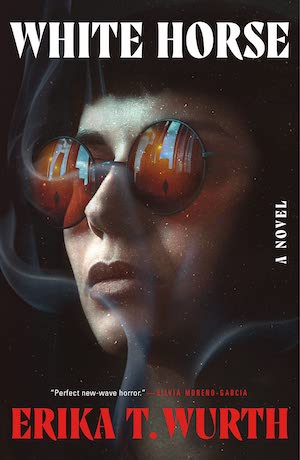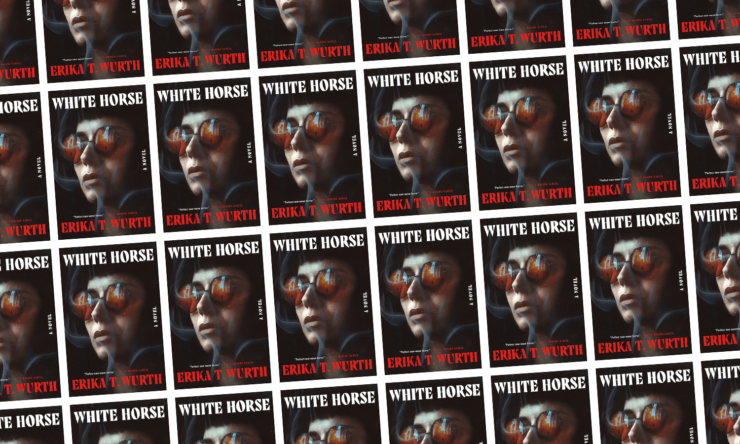What does it mean to have a great location in a work of fiction? If you’re writing something tinged with the supernatural, it can give that fiction a sense of veracity, a lived-in quality that’s magnified even more when the arcane or uncanny elements show up. Part of the appeal for me of Gene Wolfe’s Peace or Free Live Free is the way the settings of those novels feel almost tactile as I’m making my way through their pages. The same could be said for adrienne maree brown’s Grievers, which offered a rich sense of what it’s like for its characters every day—making the more speculative elements of that book even more deeply felt.
That’s also the case in Erika T. Wurth’s White Horse, which plays its supernatural elements very close to the vest and uses them sparingly.
There’s a literal White Horse in the novel—the name of the bar in which the novel opens. Narrator Kari James—Apache and Cherokee, and a Denver resident—says up-front that it’s “an Indian bar. My Indian bar.” And later, she clarifies exactly what draws her to it:
“I loved the long wooden bar, the cats wandering in and out; the mangy orange one was my favorite. She liked to sit on top of the bar and let me pet her while she closed her cloudy eyes and purred.”
Buy the Book


White Horse
Kari receives a bracelet once owned by her late mother, who went missing when Kari was young and is presumed deceased. That’s not the only trauma that Kari faced early in life: she occasionally flashes back to bygone interactions with a now-departed friend, and she’s had to care for her father for years after he sustained significant brain damage in an accident.
Once she’s put on the bracelet, Kari begins to have visions. Some are taken from her mother’s life, and some of an especially unsettling being whose likeness is also represented on the bracelet. And while the descriptions of the monster Kari sees in visions and dreams are unsettling, Wurth accentuates that with passages that evoke the being’s sensory presence:
“He’d appear in the shadows first, just a hint. Then the smell of rotting meat floating out from behind a building or a cluster of trees. His roar. My heart palpitating violently. I would begin running, hearing him behind me, catching up.”
While this is Wurth’s first horror novel, it isn’t her first work to include a sense of almost tangible foreboding. Her previous novel, You Who Enter Here, focused on a group of acquaintances who get caught up in rival New Mexico gangs. There, too, there was a feeling of dread that pervaded the book, with cycles of violence abounding in the narrative. Here, that dread has a shape—but those aspects of grappling with a troubled past and watching horrific actions play out again and again are shared by both works.
Over the course of the novel, Kari and her cousin Debby begin to investigate the bracelet—which, in turn, means investigating Kari’s mother’s disappearance. This, in turn, overlaps with some real-life history, as Kari learns that her mother had been involved in activism in the 1970s, which may have contributed to her disappearance. Wurth introduces a number of thoroughly flawed authority figures, from previously-unknown family members to law enforcement agents, into the proceedings.
There’s a reason that this novel begins with Kari in a place where she feels safe, in the company of people she trusts. The disturbances to her existence—from the supernatural to the historical—all exist in sharp contrast to the familiar and reassuring elements introduced early on. But then Wurth also puts those in jeopardy—with the White Horse facing an uncertain future and Kari’s bond with Debby becoming increasingly frayed as her investigation continues. It gives the book a subtle but impressive symmetry.
It’s also a nice touch that this novel of supernatural horrors is narrated by a fan of novels of the supernatural. Kari occasionally talks about her fondness for the works of Stephen King, and there’s a bar called Tommyknockers that’s referenced a few times in the narrative. Kari’s fondness for metal also crops up numerous times, with lengthy discussions of the works of Megadeth (it’s worth mentioning that Kari is no fan of Dave Mustaine’s politics) and a scene set at a concert by the metal band Of Feather and Bone.
Stephen King’s books aren’t the only way in which his body of work makes an appearance here. Kari’s quest for answers end up overlapping in some ways with the lore surrounding King’s The Shining—and the ways in which its influence has percolated down into popular culture. It’s another area where something familiar to Kari—in this case, a beloved book—turns into something both deeper and more uncertain than she’d believed.
But for all the presence of monsters in this narrative—and, rest assured, there is indeed a monster in this book—that sense of the familiar being suddenly upended resonates just as deeply with the notion of the horrific. After all, what’s more frightening than the people and places we love vanishing—or the idea that we never really knew them at all?
White Horse is published by Flatiron Books
 Tobias Carroll is the managing editor of Vol.1 Brooklyn. He is the author of the short story collection Transitory (Civil Coping Mechanisms) and the novel Reel (Rare Bird Books).
Tobias Carroll is the managing editor of Vol.1 Brooklyn. He is the author of the short story collection Transitory (Civil Coping Mechanisms) and the novel Reel (Rare Bird Books).










